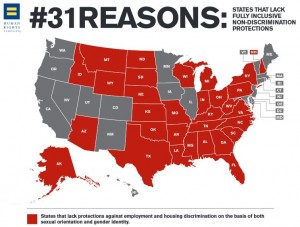 WASHINGTON – Following the Supreme Court’s ruling in Obergefell v Hodges, the Human Rights Campaign (HRC) today released a new map explaining the need for non-discrimination laws protecting LGBT people at the federal level. The map shows that the Supreme Court’s ruling has brought marriage equality to a number of states that still lack clear, fully-inclusive non-discrimination protections for LGBT people, meaning that despite the ruling, LGBT Americans can get legally married but still be at risk of being denied services for who they are or risk being fired simply for getting married and wearing their wedding ring to the office the next day.
WASHINGTON – Following the Supreme Court’s ruling in Obergefell v Hodges, the Human Rights Campaign (HRC) today released a new map explaining the need for non-discrimination laws protecting LGBT people at the federal level. The map shows that the Supreme Court’s ruling has brought marriage equality to a number of states that still lack clear, fully-inclusive non-discrimination protections for LGBT people, meaning that despite the ruling, LGBT Americans can get legally married but still be at risk of being denied services for who they are or risk being fired simply for getting married and wearing their wedding ring to the office the next day.
“Despite the important progress our nation has made by ensuring access to marriage, in 31 states, LGBT Americans are still at risk of being denied services or being fired for getting married and wearing their wedding ring to the office the next day or simply for being who they are,” said JoDee Winterhof, Vice President for Policy and Political Affairs for the Human Rights Campaign. “A federal non-discrimination bill will ensure that all employees are hired, fired or promoted based on their performance, not their sexual orientation or gender identity. Everyone should have a fair chance to earn a living and provide for their families, including gay, lesbian, bisexual and transgender people. That’s why in the months ahead, the Human Rights Campaign is committed to working toward a federal non-discrimination bill that provides clear, consistent and equal protections under federal law for all Americans in vital areas of life.”
In March, as part of its work to support a federal non-discrimination bill, the Human Rights Campaign released new polling showing strong public support for a broad and comprehensive non-discrimination bill. According to the survey, which was conducted by Greenberg Quinlan Rosner for the Human Rights Campaign, likely voters support a federal non-discrimination law by an overwhelming margin of 69 to 27. Republicans supported it 51% to 43%, Independents supported it 72% to 23% and democrats supported it 80% to 18%. The survey also showed how critically important a federal non-discrimination bill is to the LGBT community. The poll found that nearly two-thirds of self-identified LGBT Americans reported experiencing discrimination in their personal lives. View more on that poll here.
Prior to that poll, the Human Rights Campaign released a report in December, “Beyond Marriage Equality,” that highlighted the need for federal non-discrimination protections that covered employment, access to public spaces, housing, credit, education, jury service and federal funding, and how, historically, expansive legislation to address inequities is not unusual. The report details the history of such legislation, beginning with the Civil Rights Act of 1866 – the first law to define U.S. citizenship – and delves into the Civil Rights Act of 1964 and more recent laws passed to prohibit discrimination. The report also puts forth the history of LGBT-specific civil rights legislation, including the repeal of “Don’t Ask, Don’t Tell” and the federal hate crimes prevention law.











